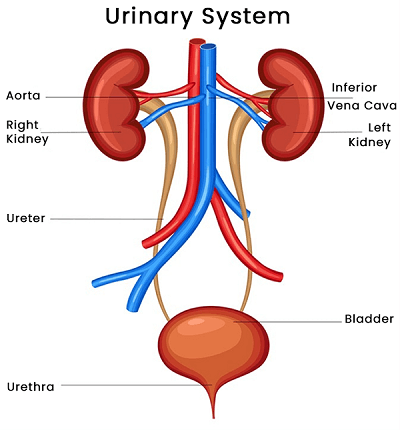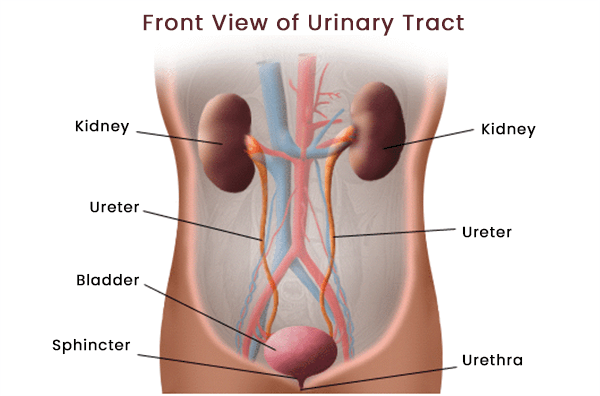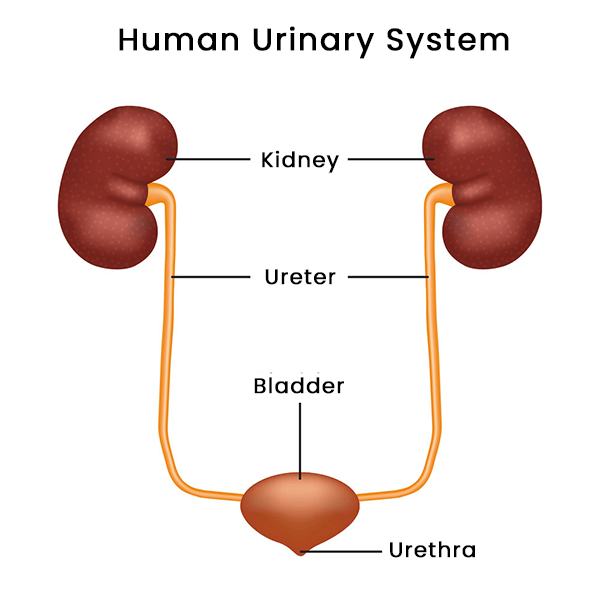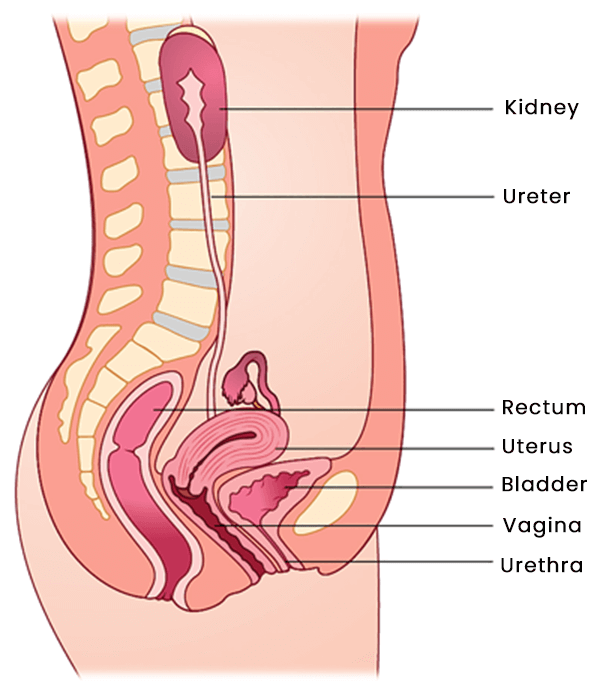Urinary system
The main organs in the urinary system are kidneys, ureters, urinary bladder, and urethra. Your blood is cleaned by this mechanism, which also removes extra water and waste. The undigested liquid not absorbed in the blood is converted into urine. There are different infections related to the urinary system, like urinary tract infections and bladder infections.

What Is the Urinary System?
Utilizing urine as a filter, your urinary system eliminates waste products and toxins from your body. It passes the toxic-containing liquid through a vast, complex network of tubes and ducts. Your digestive system and blood arteries are linked by these tubes. All the body systems are connected; therefore, the urinary system is also as important as any other body system.
Functioning of Urinary System
The urinary system works by filtering the blood containing toxins and waste material that are not required by the body and may harm if it stays in the blood. It removes excess water, salt, pollutants, and waste materials. Various urinary system components carry out the following functions:
- Blood filtration
- Separates the nutrients you need from the toxins you don't.
- Taking urine from your body and transporting it outside.
How Does My Blood Get Cleaned by The Urinary System?
The most important organ for filtering the blood is the kidneys. The functioning of the urinary system is as follows:
- A large number of arteries carry the blood to the kidneys.
- Your kidneys separate toxins from nutrients when they filter your blood.
- Your bloodstream receives vitamins, minerals, nutrients, and proteins again.
- Your ureters carry urine and waste materials to your bladder. Urine is held in your bladder until you go to the bathroom.
- Through the urethra, urine exits your body.
Components of Urinary System
All the components of the urinary system, the kidneys, ureters, urinary bladder, and urethra, work together to filter blood efficiently. They help purify the blood, store the filtered blood, and remove the waste from the body. Here are the functions of each organ:

- The kidneys are always at work. Your body excretes waste through urine, which they filter from your blood. Your two kidneys are located directly below your rib cage, one on each side of the rear of your abdomen. Each kidney is as large as your hand.
- Ureters: Your bladder receives urine from your kidneys through these two tiny tubes within your pelvis.
- Urine is stored in the bladder until it is time to be emptied (pee). It has a balloon-like form, is hollow, and is comprised of muscle. As your bladder fills up, it grows. The majority of bladders have a 2-cup capacity.
- The tube-like organ is responsible for collecting the urine from the bladder and expelling it out of the body. This tube is called the urethra. The urethra ends in an aperture that opens outside the body.
Diseases And Infections Affecting Urinary System
The ureters, kidneys, bladder, and urethra are all susceptible to various diseases. Problems, illnesses, or infections might start at birth or worsen as you age. Some typical urological conditions include:
- Infections: Problems with the kidneys, urethra, or bladder can result from urinary tract infections (UTIs) and sexually transmitted infections (STIs). If any harmful microorganism like virus or bacteria enters the body through the urethra, they reach the urinary tract and become the source of urinary tract infections (UTI). To treat a disease, your doctor may prescribe medicine.
- Structural issues: A baby may be born with birth abnormalities that interfere with the development of their urinary system. These anomalies can lead to infection and urine buildup in the kidneys. Bladder prolapse can happen later in life after childbirth or as women age.
- Kidney stones are masses that develop when urine waste clumps together. Urinary obstruction and excruciating pain can be brought on by kidney stones, also known as ureteral stones (kidney stones that travel to the ureter). To make the stones easier to pass, your doctor may break them into little pieces using ultrasonography (sound waves).
- Urinary incontinence (leakage), or loss of bladder control, results in urine leakage that can be mild or severe. Women are more prone to suffer from urinary incontinence than males. They have higher chances of developing urinary incontinence during or after pregnancy. The situation becomes worse if they sneeze, cough, or jump. You have an overactive bladder when you have a sudden, frequent need to pee. These conditions may be treated with medication.
- Obstructing the urinary tract: Cancerous tumors or growths in the abdomen can stop urine flow. It can be challenging to urinate when a man has an enlarged prostate, often known as benign prostatic hyperplasia, or BPH. Both medication and surgery are options for treating BPH. Pregnancy and gastrointestinal (GI) problems, including Crohn's disease, are other reasons for ureteral blockage.
- Chronic renal disease is most frequently brought on by diabetes and high blood pressure. You may significantly reduce your risk of kidney disease by managing your blood pressure and blood sugar. Fluid-filled cysts develop inside the kidneys due to a hereditary disorder called polycystic kidney disease. Your kidneys might be harmed by non-steroidal anti-inflammatory medicines (NSAIDs), such as ibuprofen (Advil) and naproxen (Aleve). Taking acetaminophen (Tylenol) at the typical advised dosage won't harm your kidneys. To find out which over-the-counter painkillers are the safest for you, consult your doctor. Prescription and medication overdoses can make your kidneys work too hard to filter waste, resulting in kidney failure. If there is a condition of renal failure (kidney failure), then dialysis is the option left to filter the blood. If the dialysis is insufficient, a person would have to undergo a kidney transplant.
How Prevalent Are These Infections?
Bladder infections and urinary tract infections are the most typical urinary conditions (UTIs). Women are more likely than males to have UTIs. More than 60% of women get a UTI in their lifetime.

Urinary incontinence affects around 50% of women over 65 and is typically caused by muscles that have been overstretched during pregnancy and delivery. Kidney stones are also relatively high, with 1 in 10 persons experiencing them.
Maintaining Health of Urethra
Most urinary tract issues cannot be prevented. However, you may strive to maintain a healthy urinary system by practicing good hygiene and leading a balanced lifestyle. To ensure that your urinary system functions as it should, you can:

- Be sure to stay hydrated by drinking plenty of water, which can help you avoid kidney stones and UTIs while flushing the toxins out of your system. Cranberry juice could be consumed to prevent a UTI. Cranberry compounds may prevent bacteria from proliferating.
- Consume a balanced diet Sodium- and calcium-low diets may help avoid kidney stones.
- Women should always wipe after using the restroom from front to back. Bacteria entering the vagina and leading to a UTI are less likely to occur when appropriately wiped.
- After sex, empty your bladder: If you're a woman, you should go to the restroom. Quick urination helps eliminate germs and lowers your chances of developing a UTI.
- Safe sex practices: Use a condom to shield yourself against an STI. However, spermicides should be used with caution as they might encourage the growth of germs.
- Practice pelvic floor exercises, often known as Kegels, to strengthen the muscles in your pelvic floor and lower your risk of incontinence.
When Should I Call My Doctor If I Suspect I May Be Experiencing Urinary Tract Issues?
Visit your doctor if you have discomfort or difficulty urinating. It might be an indication of an infection or another ailment. Also contact the doctor if you experience:
- Urine with blood in it.
- Burning, discomfort, or urination issues.
- Discomfort in your lower back, genital region, flank, or pelvis (the back and sides of your abdomen).
- Problems with pee leakage or difficulty retaining urination.
- An impression that your vagina is protruding in some way
Conclusion
Your urinary system is essential for the proper functioning of the body. The waste from filtered blood is urine, which contains waste and toxic materials not required by the body. The urinary system comprises different components, kidneys, ureters, urinary bladder, and urethra. Your urinary system's health can be impacted by conditions including urinary tract infections, sexually transmitted illnesses, kidney ailments, and urinary tract blockage. If you suffer from any disease described above, you must consult a doctor or healthcare provider.
|




 For Videos Join Our Youtube Channel: Join Now
For Videos Join Our Youtube Channel: Join Now









